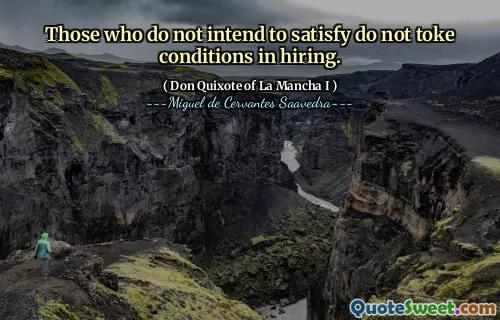"Sir," Sancho replied-, that retreat is not to flee, nor to wait is sanity, when the danger exceeds hope, and of wise is to keep today for tomorrow, and not venture everything in one day.
In "Don Quixote of La Mancha," Sancho Panza responds to his master’s desire for action with wisdom. He emphasizes that retreat is not a sign of weakness but rather a tactical decision in the face of overwhelming danger. In his view, it is smarter to preserve resources and wait for a better opportunity rather than recklessly confronting a threatening situation. Sancho conveys the importance of strategic patience, suggesting that sometimes keeping options open for the future is more prudent than risking everything at once. This advice reflects a deeper understanding of wisdom in navigating challenges, indicating that sensible decision-making often involves knowing when to hold back.
In "Don Quixote of La Mancha," Sancho Panza responds to his master’s desire for action with wisdom. He emphasizes that retreat is not a sign of weakness but rather a tactical decision in the face of overwhelming danger. In his view, it is smarter to preserve resources and wait for a better opportunity rather than recklessly confronting a threatening situation.
Sancho conveys the importance of strategic patience, suggesting that sometimes keeping options open for the future is more prudent than risking everything at once. This advice reflects a deeper understanding of wisdom in navigating challenges, indicating that sensible decision-making often involves knowing when to hold back.
